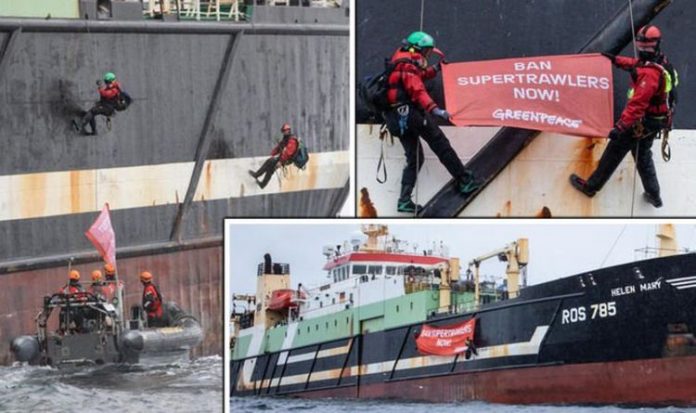EU fishermen were warned against trawling in the Central Fladen protected area, east of Scotland by Greenpeace campaigners who had climbed on board the 117 metre-long vessel. In the North Sea, activists on board the Greenpeace ship Esperanza, sailed up to the Helen Mary supertrawler and informed its captain the vessel was in a Marine Protected Area (MPA). The conservationists said its request for the ship to stop fishing in the region was ignored.
Remarkable pictures then show several activists abseiling down the side of the large EU vessel and put up a red banner which read “Ban supertrawlers now!”
Amid the stand-off, fishing deterrents were also placed in the vessels nets before the German-flagged boat left the area.
The Pelagic Freezer-trawler Association, which represents the interests of nine European pelagic freezer-trawler companies, including firms in Germany, has denied the vessel was doing anything against the rules.
Supertrawlers are highly damaging to the sustainability of the ecosystem and can catch hundreds of tonnes of fish every day by casting nets up to a mile long.

Greenpeace have clashed with a German Supertrawler in the North Sea (Image: Greenpeace)

Campaigners climb on board the EU vessel (Image: Greenpeace)
Greenpeace has called for all offshore protected areas, including Central Fladen, to be put off limits to industrial fishing by 2030.
The zone lies within the Fladen Grounds, a large area of mud located in the northern North Sea, covering an area of 357m².
According to the Joint Nature Conservation Committee (JNC0, the public body which advises the UK Government on conservation, the seabed is characterised by feather-like soft corals called sea-pens, and the burrows made by crustaceans, such as mud shrimp and the Norway lobster.
The burrowing activity in the mud is vital in releasing nutrients and helps to provide shelter to other marine life.

Activists put a banner on the side of the German boat (Image: Greenpeace)
Chris Thorne, a Greenpeace UK oceans campaigner on board Esperanza, has called for an outright ban on supertrawlers and insisted its presence in protected areas is a “mockery” of the regulations.
Mr Thorne said: “Supertrawlers have no place in our protected areas. What use is a protected area, when the highest intensity industrial fishing vessels are allowed to operate inside it?
“Regardless of whether a protected area protects the seabed, or marine life like porpoises which are directly threatened by supertrawlers, the operations of a supertrawler in a supposedly protected area make a mockery of the word protected.”
A 2019 study by Greenpeace using tracking data found trawlers over 100 metres-long spent 2,963 hours fishing in UK MPAs in 2019.
READ MORE: Coronavirus map LIVE: Forget Tier 3! Hotspots face NIGHTMARE plan

The EU trawler was sailing in the Central Fladen protected area (Image: Greenpeace)
None of the 25 supertrawlers were British-owned.
Mr Thorne added: “Every year since 2016, supertrawlers have doubled the time they’ve spent fishing in our protected areas.
“Our government refuses to act, so we’ve been forced to step in. We have stopped this destructive industrial vessel from fishing in one of our protected areas for as long as we can.
“We can’t stop it permanently, that’s up to our Government. They could announce a ban on destructive industrial vessels fishing in our protected areas tomorrow. They must act.”
DON’T MISS
Brexit LIVE: EU makes fishing POWER-GRAB as army of 50 UK officials [LIVE]
London covid: The full number of coronavirus cases in every London [INSIGHT]
UK weather forecast: Arctic air to grip Britain as icy snow blast hits [FORECAST]

A map of EU countries most reliant on UK waters (Image: EXPRESS)
Gerard van Balsfoort, President of the Pelagic Freezer-trawler Association, said: “These vessels were operating entirely legally. Greenpeace’s campaign peddles mistruths and ignores the scientific basis for MPAs.
“After decades of collaboration with governments and the scientific community, the processes pelagic fishing has in place ensure we are fishing sustainably.”
The UK Government will take back control over its waters and as well as leaving the EU’s controversial Common Fisheries Policy after the Brexit transition period ends.
MPs are currently debating the new Fisheries Bill in the House of Commons.
The legislation states: “The Bill is intended to underpin the UK’s management of fisheries as an independent coastal state, when the UK Government will be responsible for setting Total Allowable Catches in UK waters.”







